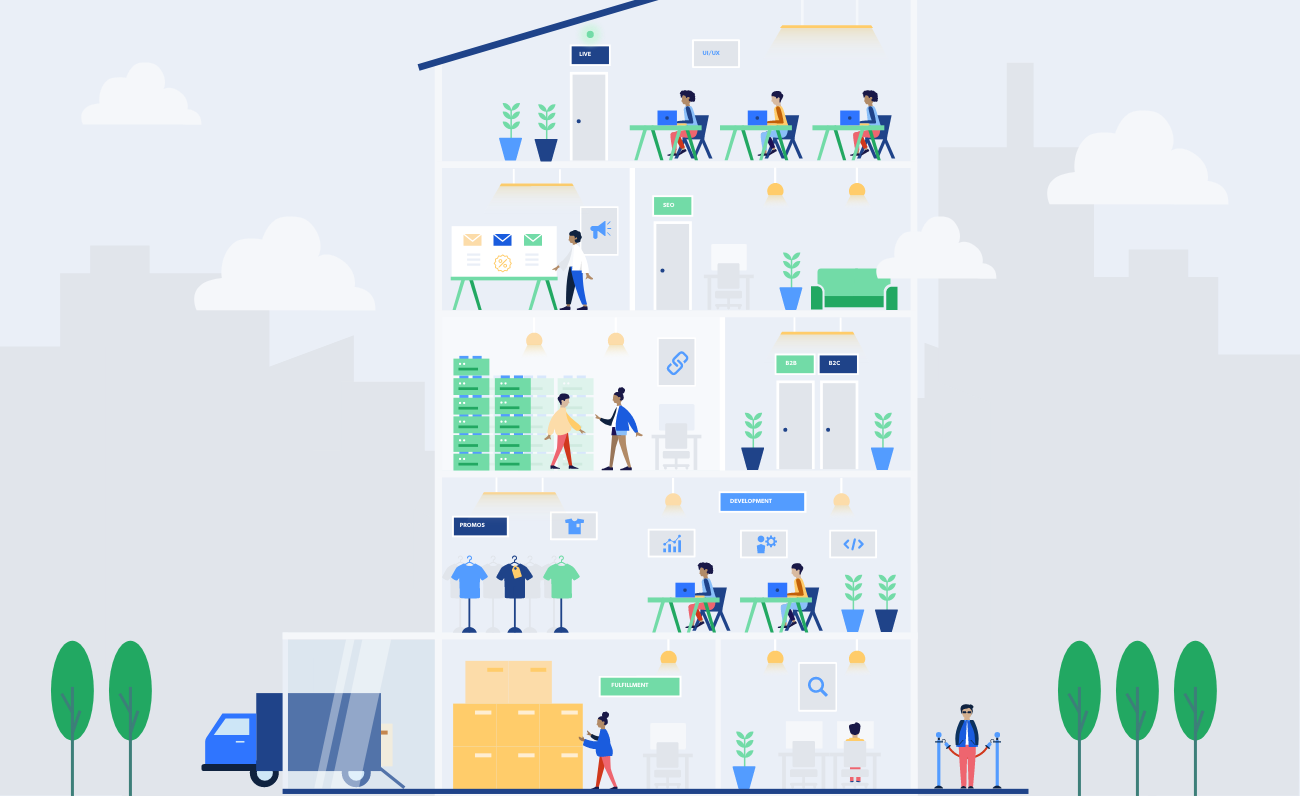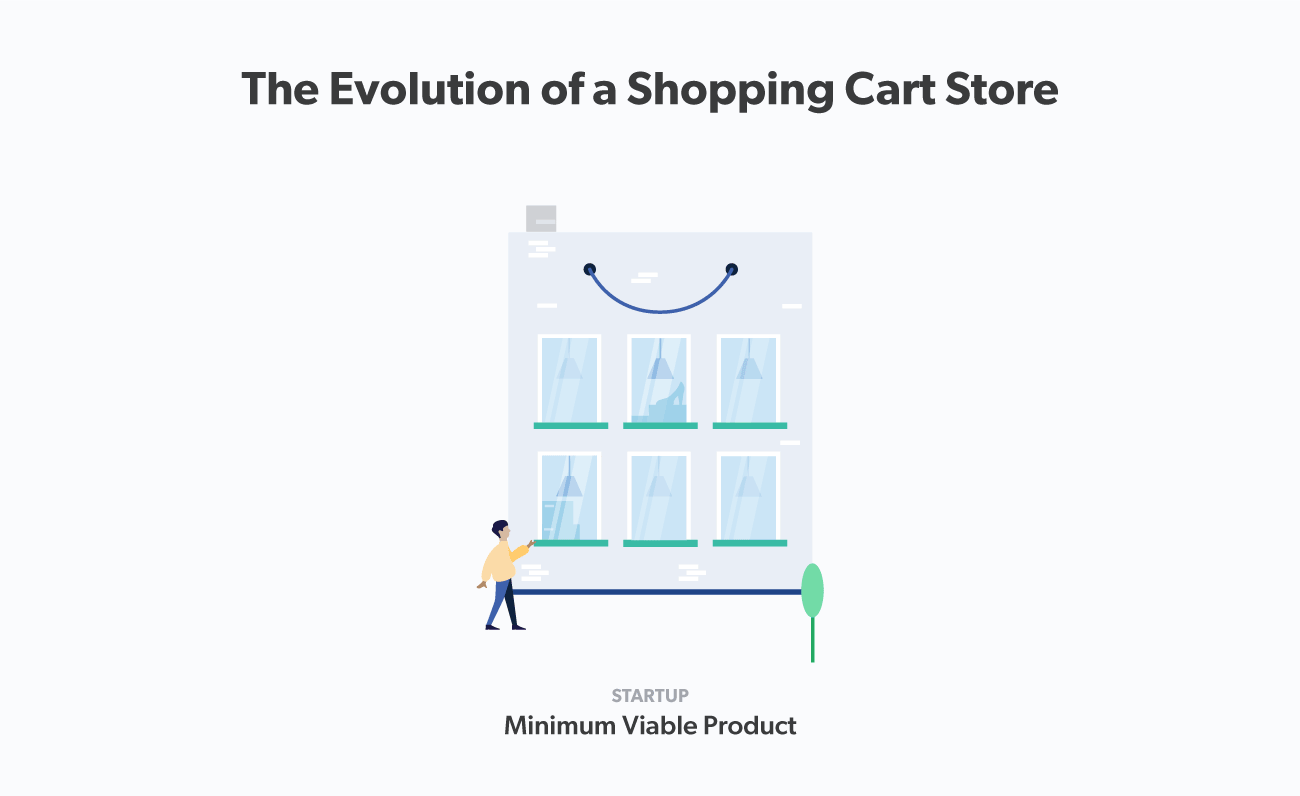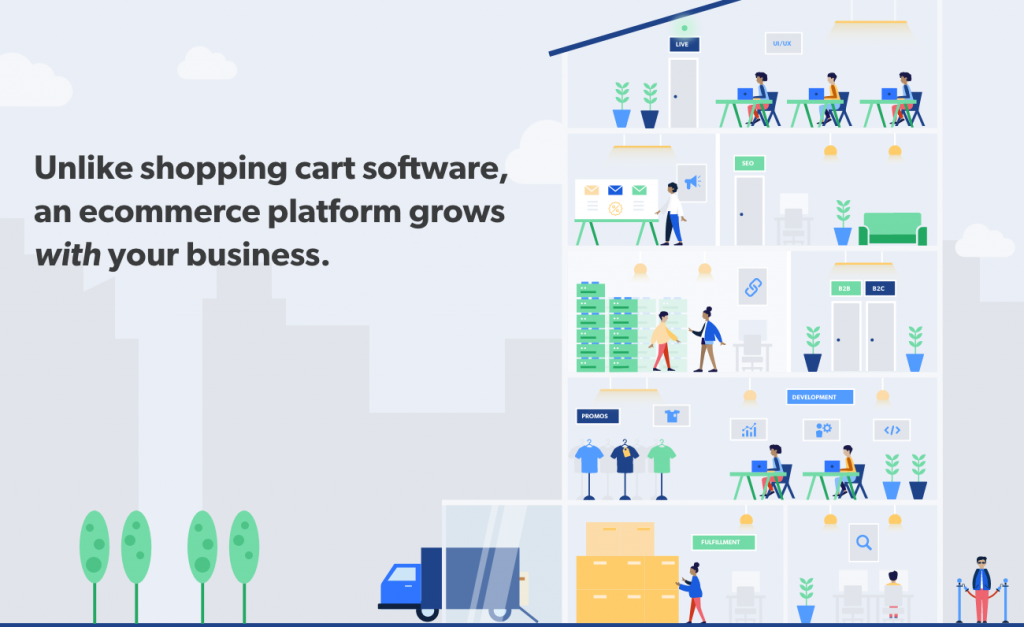
Boost Efficiency: Streamlining Large Ecommerce Catalog Product...
By Miva
The right solution for your business is the difference between staying ahead and falling behind in ecommerce.
 By Miva | October 27, 2021 | 6 minute read
By Miva | October 27, 2021 | 6 minute read
Want to read this blog offline?
No worries, download the PDF version now and enjoy your reading later...
While exploring options, you might have come across “shopping cart software” and “ecommerce platform” options. The terms are often used interchangeably—in large part because they share the same basic function. Both tools allow you to launch an online store, showcase your products, and manage your ecommerce sales.
But what exactly is an online shopping cart, and what is the distinction between an ecommerce platform and a shopping cart? In this article, we explain the role of website shopping carts, why shopping cart software functionality and ecommerce platforms aren’t the same, and which solution might be the better investment for your business.
Shopping carts are a key part of any ecommerce website. Similar to a tangible shopping cart in a physical retail store, online shopping carts bridge the gap between browsing and buying.
Shoppers use a website shopping cart to hold items, save selections while navigating a site, and complete their purchase. The digital nature of ecommerce means the website shopping cart software powering this front-end experience fills additional roles beyond a physical cart, like storing information, rendering important product and website content, and enabling online sellers to manage products and customer data.
Online shopping carts are the foundation of any ecommerce site, so having the right solution is key to the long-term success of a business.
For those considering the best solution for their business, there is a distinction between basic shopping carts and ecommerce platforms. In addition, there are two types of website shopping carts: software-as-a service and third-party.
SaaS stands for software-as-a-service and describes shopping cart or ecommerce platform solutions that are hosted and maintained by a third-party vendor. This hosted shopping cart solution does not require a separate download and can be accessed on a web browser. Server backups, maintenance, and upgrades are maintained by the SaaS provider.
With a third-party or plugin-based shopping cart, online merchants can build and customize their own type of cart. They can also increase the flexibility of their cart by changing features and adding in plug-ins for expanded functionality. Third-party shopping carts may require more hands-on expertise and technical support.
The purpose of an online shopping cart is to facilitate sales on a website, which includes both front-end and back-end aspects. On the front-end, the shopping cart ecommerce functionality should provide an engaging, visually appealing, consistent, and user-friendly interface. On the back-end, a shopping cart seamlessly integrates with the overall platform and provides functionality for the seller, which includes storing products and data, accepting and processing customer payment, calculating tax and shipping costs, and distributing order information for order fulfillment.
A website shopping cart is just one piece of the ecommerce ecosystem. It’s either a simple separate plug-and-play solution (what we call a shopping cart software) or part of a more substantial all-in-one ecommerce platform.
A shopping cart is software integrated into a website that gives customers the ability to select items for purchase on the front side and allows businesses to manage and sell those products on the back end. The software acts as a digital storefront, allowing you to accept payments, compile order details, and organize relevant information.
Designed to be a plug-and-play solution, shopping carts typically come with ready-to-go site design templates and a suite of apps and third-party tools to provide any desired functionality. The simplicity of shopping cart software means it can typically be offered as a free trial, whereas more robust solutions are customized to fit the businesses that use them.
An ecommerce platform is not just a shopping cart. Although it serves a similar purpose, as an all-in-one solution, an ecommerce platform can fill a wide range of functions, from inventory management and order fulfillment to checkout optimization and marketing campaigns. An ecommerce platform goes far beyond basic shopping cart functionality to deliver the essential tools growing businesses need to build a unique and competitive online presence.
Shopping carts benefit businesses that need a simple system to list their products and facilitate customer purchases. As a minimum viable solution, shopping carts excel at providing quick and easy website setup with low initial costs. They appeal to up and coming entrepreneurs, budding brands, and small businesses with modest ecommerce strategies.
However, as you begin to scale your business and desire to stand out in a competitive market, you’ll want to add new, cutting-edge features to your site. Because they are run by templates and external apps, shopping carts often lack the flexibility for you to customize an online experience that’s truly unique to your brand. Adding new functionalities can also result in hidden fees and unexpected additional costs.
Unlike cookie-cutter shopping cart themes, an ecommerce platform allows your business to shine and empowers you to sell the way you want. These platforms are designed with the understanding that each business has unique needs and requirements for their website.
The key differentiator with ecommerce platforms is that they store information in one internal database and have functionalities built into their core software. When you’re looking to add features to your site, a ecommerce platform provides a more customizable, fully-featured suite to give you a leg up on your competition.
Functions like updating your catalog size, presenting product attributes, displaying products with merchandising tools, launching special landing pages, customizing the checkout process, and leveraging marketing tools are more accessible, allowing you to be agile with website updates and adapt quickly to new trends and customer preferences.
While selling items with a shopping cart can be a great entry point, your growing business will want to control how your brand looks and functions. An ecommerce platform benefits enterprise businesses that want to differentiate their brand, offer a best-in-class user experience, and pursue long-term ecommerce growth. The flexibility you achieve with an ecommerce platform can be the difference between an order won and an order given away to the competition.
When choosing an ecommerce platform to power your online business, you’ll want to consider factors like pricing, core functionality, and extent of customization, flexibility, and agility and how these align with your needs. These factors will help you determine the solution that will best support your ecommerce goals.
For a list of specific solutions and their features, check out our comparison of ecommerce platforms.
Picking between a shopping cart and ecommerce platform requires a clear understanding of the unique requirements and priorities of your business. As you talk with providers, you’ll want to get a sense of each solution’s ease-of-use, customization capabilities, marketing tools, level of maintenance, data storage, platform pricing and new feature costs, and support availability.
On the market, many shopping cart software and ecommerce platform solutions float on either extreme of a spectrum—either they’re simple but limiting or customizable but too complex.
Learn how Miva can offer a “just right” balance between easy-to-use tools and powerful ecommerce capabilities and allow you to be an agile and adaptable seller.
This blog was published on January 29, 2020 and updated on October 27, 2021.
Love it? Share it!

Author's Bio
Miva
Miva offers a flexible and adaptable ecommerce platform that evolves with businesses and allows them to drive sales, maximize average order value, cut overhead costs, and increase revenue. Miva has been helping businesses realize their ecommerce potential for over 20 years and empowering retail, wholesale, and direct-to-consumer sellers across all industries to transform their business through ecommerce.
Copyright © 1997 – 2024 Miva®, Miva Merchant®, MivaPay®, MivaCon®, Camp Miva®, Miva Connect®, Miva, Inc. All Rights Reserved.